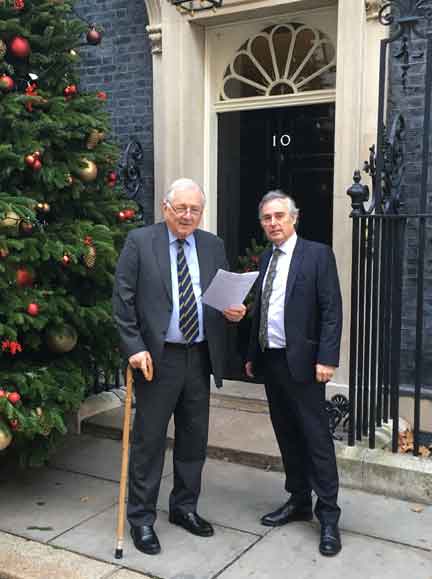
A last minute attempt to stop LKP from publishing three legal opinions extremely critical of the government’s bungled reform to Recognised Tenants’ Associations failed last week.
The government introduced a statutory instrument in October that has actually made the position of leaseholders worse.
The failing was referenced in the Commons by Sir Peter Bottomley with Communities Secretary James Brokenshire on December 10:
This bungling by officials followed years of persuasion by LKP, and MPs such as Sir Peter and members of the Lords such as Lord Young of Cookham (formerly Sir George Young). All regarded reform to Recognised Tenants’ Associations as long overdue.
Sir Peter and Martin Boyd, the LKP chair, even took the issue to Number 10 on December 4:
LKP and Bottomley at Number 10 to reverse flawed reform of recognised tenants’ associations
The government has ruled that when leaseholders seek to form an RTA they contact the landlord, who has 4 months to write to all the other leaseholders in a block and ask whether they accept that their contact details can be shared. In fact, their details are already publicly available on the Land Registry at £3 a time.
LKP today published the analysis from barristers Justin Bates and Clara Zang, of 4-5 Gray’s Inn Square, and Rebecca Cattermole, of Tanfield Chambers.
LKP announced that it was to publish the legal opinion and a half-hearted attempt was made to bar barrister Justin Bates from offering his opinion of the law change in public. Mr Bates is employed at the Law Commission part time, and the concern was that he would be commenting on government policy.
This nonsense ceased when the Law Commission accepted that Mr Bates was, in fact, commenting on government enacted legislation.
LKP makes these details known to demonstrate the frustrations involved in changing even relatively simple issues in leasehold.

Recognised Tenants’ Associations are the first step that leaseholders make to mobilise and get organised, either to opt for right to manage or to enfranchise.
In spite of public relations blather to the contrary, landlords and their property managers loathe them and introduce impediments to their formation.
Like controversial freeholder John Christodoulou, who spent £85,000 on a QC for an afternoon in the property tribunal to thwart one at West India Quay (accompanied by an 11th hour defamation threat to association secretary).
West India Quay’s victory against £74,560 legal onslaught … for a recognised residents’ association
As it happens, more than 100 members of the residents’ association at Mr Christodoulou’s Canary Riverside were also threatened with defamation proceedings in a separate dispute.
Canary Riverside freeholder told to co-operate with court appointed managing agent
LKP and others had urged the government to provide leaseholders with the means to contact their neighbours. Instead, the government has left this crucial conduit safely in the hands of commercialising landlords.
Rebecca Cattamole writes:
“For a matter which should be relatively straightforward, tenants must now grapple with statute; regulations; explanatory notes; an explanatory memorandum; and forthcoming non-statutory guidance. Applying for recognition is now fraught with difficulty.
“The Regulations will prove either to be a charter for litigation or will act as a powerful deterrent for many tenants.
“It is abundantly clear in what it does not do, that is, make it easier for tenants to obtain recognition.”
Justin Bates and Clara Zang write:

“The government has recognised for several years that forming RTAs is a desirable objective and appreciated the difficulties faced by secretaries when attempting to make initial contact with qualifying tenants.
“However, requiring the landlord to seek written consent from potential members before passing on their information has the effect of creating a piece of legislation which will make very little practical impact on the current state of affairs.
“If this power is to be efficacious then there should not be any requirement for the landlord to obtain written consent of the leaseholders before providing these contact details. The landlord should just be required to provide them to the Secretary of the RTA within a short period of time.
“In conclusion, the overly cautious approach taken to the data protection legislation is unnecessary and unjustified and is not supported by the Information Commissioner. As a result of requiring express consent, Part 3 has the effect of achieving none of the objectives that it had set out to address.”
LKP reviews the new Statutory Instrument on Recognised Tenants Associations (RTAs) over three articles.
The first article sets our the chronology of the work that resulted in this Statutory Instrument, along with our comments on the consultation results.
The second article sets out the independent legal opinions on the viability of the SI.
The third article is a test of the RTA SI in practice and our conclusions.
The conclusion from these articles is that we believe the RTA SI has major flaws. We do not believe the SI will achieve the objectives set out by Ministers from 2014 onwards.
We end by pointing to the fact the SI may have a number of unintended consequences for other existing legislation and other proposed leasehold reforms.




 Recognised Tenants’ Association review – Part I
Recognised Tenants’ Association review – Part I






















Back in 2012/13 at a meeting held by the Area Manager (AM) & Regional Manager (RM) to remove the position of our Residential House Manager. I asked what help would they provide to set up a Residents Association (RA). Six years later I am still waiting for the information and the written procedure to do so.
Firstport Retirement then Peverel Retirement had no interest in setting up an organisation that provided other leaseholders with facts & figures regarding what they do, how they do it, what they charge, it also provides through legislation for a in-depth check on the Service Charges, by an outside party.
We learned that many RA were infiltrated by residents who were provided favours if they prevented or made life difficult for the RA to perform. A local development was set up and began with support from residents. It lasted less than 2 years as some residents questioned every aspect of what was to be carried out. The RA slowly dwindled till it was no longer able to function and finally disbanded.
Other developments had strong RA when people such as my friend Norman Greed who was brilliant and was able to get the residents to address the real problems,.
It is OK for Managing Agents (MA) to agree to a RA but the AM is compelled to participate and very few actually want this association as it makes it difficult to carryout the MA requirement which differ totally to those of the resident.
Norman if you read this please provide your knowledge and experience for the readers of this brilliant website.
In my experience, leaseholders waste their time and money forming a tenants association.
Like all things leasehold, the theory may not match reality.
Before surrendering my private time to forming and helping run an RTM, I did all the work needed to form a TA first. Neighbours did me the “favour” of humouring my suggestion. Not the same as volunteering to do any work.
When the freeholder and agent ignored the TA, I completed the process to get certified recognition from the court. We became an RTA. Hurrah.
Made no difference at all. Not one bit.
Based on experience still unfolding, if managing agents appointed by an RTM company will freely ignore the signed contract or provide data requested, absurd to imagine they will respect an RTA.
No surprise to me government has made forming an RTA harder. Only question is why anyone believes the theory that an RTA can achieve much that is meaningful.
Got that T shirt too. Next theory…
Paddy having seen and taken part in TA before I retired, found good and bad. Mostly those that failed were due to:-
1. Lack of support by residents
2. Poor control by those who were appointed
3. Failure by residents to understand the main function
4. Infiltration by those with different agendas
5. Bullying by residents
6. Infighting between members of committees
So in my experience, leaseholders do not always waste their time and money, but I accept the theory may not match the reality. I also took part in TA when as a Surveyor for a very large Housing Department and in the Private Sector when at Urban Renewal we set up Resident Associations to refurbish the inner city of Birmingham in the 1980s. It was hard work simply because each resident has their own views and it took time to set up with individuals who understood the need for the association following a set of rules with a chairperson who can bring the residents together.
The fact Freeholder and MA ignored the RTA is not a surprise. We receive quarterly Trial Balance/Audit Trails, which began in 2012, checked the previous 6 years from 2006 to 2012 finding thousands of pounds we paid which was refunded. Having spent time checking the Expenses Files and the Invoices a pattern was seen of how the duplication of charging and charging for works at other developments and excessive costs for Sundry Items, Private Phone calls made not refunded, and now the costs for further Line Rentals and the cost of Broadband over the past 18 months. Within the Expenses File we also found hidden costs that were not clear such as the Training Costs that were transferred to Service Charges that are actually Operating Costs. Gradually the Operating Costs which was once paid for under the Management Fees are slowly been transferred, but who would know or who allowed this to happen?
What is a Residents’ Association
Residents’ Association is a group of leaseholders who have been granted leases from the same Landlord on similar terms and which leases include provisions for the payment of variable service charges.
To be effective, a Residents’ Association should be formally recognised, so who can become a Member of a Residents’ Association?
In general terms to become a member of a Residents’ Association you must be contributing to a Service Charge, an amount in addition to Ground Rent and is payable directly or indirectly for services, repairs, maintenance, improvement or insurance and the whole of part of which varies according to the relevant cost.
This should be contrasted with leaseholders who pay a fixed or non-variable service charge: in such a situation, whilst the leaseholder would be entitled to membership of the association, they should not be entitled to a vote. The position is the same with sub-tenants. Landlords and or Managing Agents are not permitted to become members.
Why form a Residents’ Association?
Residents’ Associations are usually formed with a view to represent the residents and members to an “independent” Landlord. In addition, a recognised Residents’ Association may also request Expenses Files and the Trial Balance/Audit Trail containing a Summary of Costs etc.
Further, a Landlord is also required to consult a recognised Residents’ Associations on matters such as increases in Service Charges and Management Fees.
A recognised Residents’ Association can require the Landlord to consult them concerning when appointment a New Managing Agent or setting up Contracts.
Why didn’t Sir Peter or Lord Young pray against the SI in Parliament? That would have stopped it in its tracks.
Jackwb. All three APPG co-chairs and vice chair Madders did put down an EDM motion to “pray” against the SI. Their requests were ignored by the Minister on the advice of officials.
.